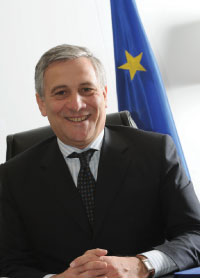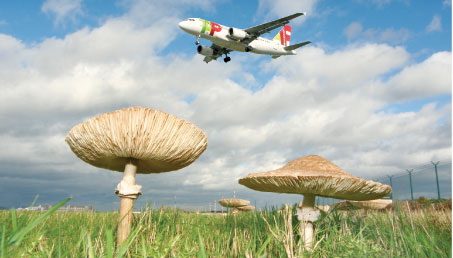
During its session of 14-17 September, the European Parliament approved the re-appointment of José Manuel Barroso as President of the European Commission. It will be Mr Barroso’s second five-year term as Commission President.

Brian Simpson MEP (UK) from Northern England has been appointed Chairman of the Transport Committee (TRAN). Mr Simpson belongs to the S&D Group as well as the New Labour in the UK.
Legislation affecting civil aviation is increasingly enacted at the European level and every five years, the changes in the EU institutions naturally affect the primary mission of ACI EUROPE: to work closely with policy makers and industry partners, thereby ensuring that European airports are fully integrated in decision making processes affecting our industry.
2009 is one of those years. The mandate of the current European Commission expires on 23 November. Thus, the European Commission will shortly welcome a new college of Commissioners, appointed by the President of the Commission and confirmed by the European Parliament. It’s all change at the European Parliament too, thanks to elections which took place at the beginning of the summer.
European Parliament
Elections to the European Parliament (EP) were held in the 27 member states of the European Union (EU) between 4 and 7 June 2009. A total of 736 Members of the European Parliament (MEPs) were elected to represent some 500 million Europeans, making these the biggest trans-national elections in history.

At time of press, Commission Vice President Antonio Tajani is rumoured to remain in his current role as Commissioner for Transport & Energy.
The 7th legislative term runs from 2009 to 2014 and the results of this election resulted in a significant swing in favour of more conservative and green-politics.
The biggest change to the new EP is a considerable shift to the right. While support for the socialist and social democratic parties reached a record low in many member states, the conservatives on the whole did not suffer any major losses. Even governing parties, which are usually punished in European elections, managed to remain in the lead over their socialist opposition in most places. The exceptions were Denmark, Greece, Malta and Slovakia where socialist rather than conservative parties were in the lead, as well as Belgium, Cyprus and Sweden where socialist and conservative parties received equal votes.
The weak performance of the socialist and social democratic parties has to be seen in the context of the current economic and financial crisis.

In the months ahead, the most pressing issues are expected to include the aviation security proposal for the removal of the ban on liquids, aerosols and gels (LAGs).
Those who sought change opted either for the ‘green new deal’ propagated by the Greens, the radical left or the extreme right. Indeed, record gains were made by the Greens, largely due to their remarkably strong performance in France as well as Germany and French-speaking Belgium. The reinforced presence of the Greens makes them a force to be reckoned with, especially as the policy agenda of the new legislature is set to address climate change and energy policy – both areas of relevance to the airport sector.
Brian Simpson MEP (UK) from Northern England has been appointed Chairman of the Transport Committee (TRAN). Mr Simpson belongs to the S&D Group as well as the New Labour in the UK.
European Commission President re-appointed
During its session of 14-17 September, the European Parliament approved the re-appointment of José Manuel Barroso as President of the European Commission, It will be Mr Barroso’s second five-year term as Commission President.
Mr Barroso was elected by 382 votes in favour, 219 against and 117 abstentions in a vote held by secret ballot on Wednesday. The approval required a simple majority of the votes cast as the vote took place under the rules of the Nice Treaty. Abstentions did not count.
Previous votes on Commission Presidents:
- 22 July 2004 José Manuel Barroso 413-251-44
- 5 May 1999 Romano Prodi 392-72-41
- 21 July 1994 Jacques Santer 260-238-23
Barroso and the European Parliament
The Parliament debated José Manuel Barroso’s statement on 15 September before the vote on his appointment on the next day. Having defended his programme for the next five years before the political groups, Mr Barroso presented his political guidelines to the full Parliament. The different political groups expressed their support for, or lack of faith in, Mr Barroso, some demanding more concrete action.
Mr Barroso focused on economic recovery combined with a social market, listing proposals he wants to implement if elected. “I am committed to fighting social dumping” he said, announcing a revision of the working time directive. He also promised initiatives to eliminate the gender pay gap. As for the EU budget, Mr Barroso proposed to “move towards an approach based on solidarity”. He stressed “the EU must have a more transparent and efficient way of financing its policies”. He also stated his intention to create the new position of ‘Climate Change Commissioner’ to accelerate the EU’s progress towards becoming a more efficient green economy. This is seen as a priority to boost the competitiveness of Europe.
Nov. 2009-Jan. 2010:
Mr Barroso is expected to announce the new College of EU Commissioners in the coming weeks and each Commissioner must pass an approval procedure at the European Parliament. The timeline for the appointment of the full College of Commissioners is currently expected to take place between November this year to January 2010.
At time of press, Commission Vice President Antonio Tajani (interviewed in the December/January issue of Airport Business) is rumoured to remain in his current role as Commissioner for Transport & Energy.
In the weeks and months ahead, the most pressing issues for airports are expected to be the aviation security proposal for the removal of the ban on liquids, aerosols and gels (LAGs), the second phase ‘Open Skies’ negotiations between the EU and US and further liberalisation initiatives across the Mediterranean and to the East of Europe, as well as revision of the EU regulations on airport slots and ground handling. A more detailed work programme will follow towards the end of the year.
The institutional structure and efficiency of the European Union will further evolve, if the Republic of Ireland votes ‘Yes’ to the Lisbon Treaty, when it votes for the second time in early October.
The Global Angle: the 15th Conference of Parties (COP15)

The December meeting in Copenhagen (COP15) will see major ambitions regarding a global approach to Climate Change, discussed by various world leaders in attendance. All stakeholders in aviation are calling for a global sectoral approach and insisting that aviation be treated like any other industry.
It is also worth noting that December will bring the COP15 meeting in Copenhagen. The sessions (COP 15) of the United Nations Framework Convention on Climate Change are only open to Parties of the Convention and Observer States (Governments), the United Nations System (UNEP, IPCC, the World Bank, etc) and observer organizations duly admitted by the Conference of the Parties. In addition, accredited press is allowed to cover the proceedings of the Convention. The priority for this meeting is agreement of a global approach to Climate Change. The predicted results of this meeting are being seen as something of a sequel to the Kyoto protocol of late 1990’s. The issue of Climate Change has gone from being a footnote on the political landscape to one that is now foremost on the political agenda at both EU and World levels. All stakeholders in aviation are calling for a global sectoral approach and insisting that aviation be treated like any other industry.







